The chess reality behind the virtual reality
You'll have to wait for to see the full multimedia of our hour with Garry Kasparov
the day after the match. He went over every X3D Fritz game and also talked about
the use of computers in his work on his book series, "My Great Predecessors."
You'll soon be able to check it out in full in the multimedia area of Playchess.com
server.
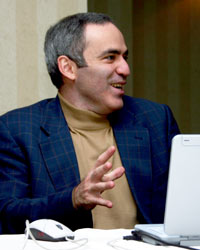 Kasparov
couldn't really estimate exactly how much the X3D virtual reality surroundings
effected his play. He did say that they had made changes in the game display
before game four that improved things significantly. The X3D effect that makes
the board and pieces appear to pop out of the screen was actually much better
to play on than the more traditional 3D effect of only the pieces "floating"
within the confines of the monitor.
Kasparov
couldn't really estimate exactly how much the X3D virtual reality surroundings
effected his play. He did say that they had made changes in the game display
before game four that improved things significantly. The X3D effect that makes
the board and pieces appear to pop out of the screen was actually much better
to play on than the more traditional 3D effect of only the pieces "floating"
within the confines of the monitor.
We had an interesting discussion about the other effects of virtual reality
play, especially about a possible connection to his fatal blunder in game two.
Every chessplayer has experienced a moment in which he notices something when
the piece is already in his hand. You can visualize the piece on its new square
for an instant. In the case of his 32nd move there is a very strong visual element.
The rook now on g7 cuts off the connection of the bishop on h6 and the rook
on f8, which is now unprotected.
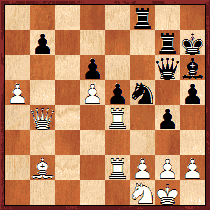 Position
after 32...Rf7-g7??
Position
after 32...Rf7-g7??
The ghost image of the protected rook on f8 could not be dispelled in virtual
reality the way it might be if you had the piece in your hand. It's quite possible
that had Kasparov been on a regular board the sight of the rook coming to g7
would have exorcized that ghost and he would have put the rook back on f7 to
consider where else to put it, probably c7.
Kasparov went out of his way to emphasize that he wasn't trying to use the
new surroundings as an excuse for the loss or for not winning the match. He
thought it was interesting how the four games could teach us more about how
the mind works when we play chess.
The lack of the usual props like a clock to press and a scoresheet to write
on left him feeling a little lost during the games, like smoker who is trying
to quit chewing on pens and pencils. The only item on the desk in front of the
monitor was a large joystick he could use to adjust the angles of the X3D board.
Sometimes, he said, he felt like just grabbing it as if he could start flying
or shooting things as in a video game!
He said he and his analysts had been surprised to find that X3D Fritz had surpassed
Deep Junior in most tactical positions in their tests. The supremely tactical
Junior engine he faced in January considered the most dangerous computer opponent
for him because of its sacrificial style. According to Kasparov, X3D Fritz also
plays less cautiously with material and solves most tactical positions even
faster than Junior.
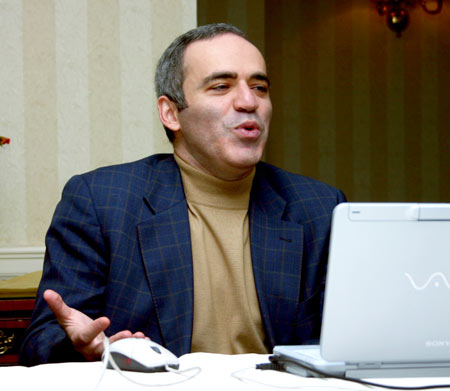
We also had long discussions about changes to make in the next
match, and not just to the human's advantage. The ESPNs of the world want a
sport with drama and competition. Science wants an experiment in cognition and
artificial intelligence. Chess wants, well, good chess. It's not easy to make
everyone happy.
If you give the human more time to avoid silly blunders the ESPN
viewers wonder why you are handicapping the computer. If you make the games
longer you will have trouble getting enough time to show a full game. (Piles
of e-mail came in protesting ESPN's cut-off of game three after only 90 minutes.
But it was Sunday, the biggest day in sports, and chess still couldn't compete
with tennis and basketball.)
Another point of contention is the way so much emphasis has moved
to the opening battle. If the human gets a closed position as in game three
the computer can lose without a fight. Humans aren't going to play sharp 1.e4
games because they can't memorize the millions of positions a computer can have
in its opening book.
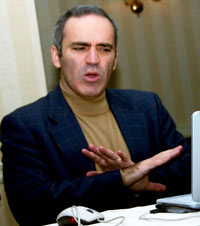 The
idea of allowing the human player to access a database once or twice, like calling
a time-out to consult the coach, is being floated. The alternative of stripping
the computers of their opening books completely must be too far in the other
direction since of course the human player has his own "book" in his
memory.
The
idea of allowing the human player to access a database once or twice, like calling
a time-out to consult the coach, is being floated. The alternative of stripping
the computers of their opening books completely must be too far in the other
direction since of course the human player has his own "book" in his
memory.
Watching a "battle of the databases" probably won't
be very interesting to the audience, expert or amateur. Most humans would be
delighted to see the computers tossed out on their own without a book because
it would probably drop their effective performance several hundred points. Chess
openings are empirical and you can't expect a computer to reinvent the wheel
to perfection every time you turn it on.
Kasparov has a point when he says it could make for more interesting
chess if every game didn't become a battle between his memory and a database
of three million positions. He thinks the games could be fantastic battles if
he could play 1.e4 against X3D Fritz next time around, something he simply can't
do now because of the depth and breadth of the opening databases.
In response to ICGA President David Levy's question, Kasparov
talked about the World Computer Chess Championships starting this week in Graz,
Austria. The top human player has become quite an expert on the top computer
players! As Junior co-programmer Shay Bushinsky said after their match in January,
"Garry probably knows more about Junior now than we do."
The Fritz team was flying off to Graz from New York and Kasparov
wondered at how much progress the other top programs had made in the past year.
"Fritz, Junior, and Shredder clearly have the best chances, and Brutus
probably. It's been a year since the last versions and they can make a lot of
progress in that time."
Since we all use our favorite engines to kibitz when we watch
Linares and other top human tournaments we wonder how far we have to go until
we have the likes of Garry Kasparov commentating on the computer-computer battles.
Kasparov didn't laugh at this idea at all. In fact he said that when he was
preparing for this match he was occasionally stunned at the high quality of
some computer-computer games. "One combination, I think it was a game Fritz
lost to Shredder in a Sveshnikov, it took me a while to see what was going on!
It was some incredible tactics! You really can't ignore these games anymore."
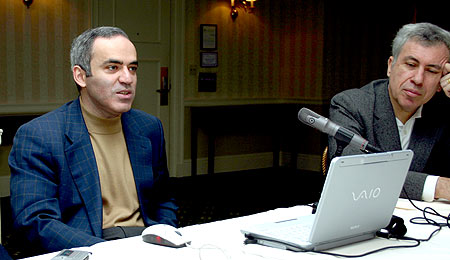
Garry Kasparov and David Levy
Part of that effect might stem from the way computer chess programmers
are moving more towards "humanizing" their programs to combat the
top Grandmasters instead of trying to beat up on their peers. Good anti-human
chess is not always the same as good anti-computer chess, although they do usually
cross over.
Fritz creator Frans Morsch said they he had stopped worrying
so much about his results against other programs. These computer-computer results
were still useful to make sure you hadn't broken anything and as an objective
metric. "But our focus is completely on playing against Grandmasters now
and playing good chess. Remember that Fritz was designed to be a ChessBase analysis
module. The less it plays like a computer, the better."
Maybe these things are already becoming a little too much like
humans. At the closing ceremony after game four, Eliot Klein, CEO of X3D, read
the following e-mail from X3D Fritz.

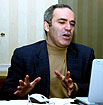

















 Kasparov
couldn't really estimate exactly how much the X3D virtual reality surroundings
effected his play. He did say that they had made changes in the game display
before game four that improved things significantly. The X3D effect that makes
the board and pieces appear to pop out of the screen was actually much better
to play on than the more traditional 3D effect of only the pieces "floating"
within the confines of the monitor.
Kasparov
couldn't really estimate exactly how much the X3D virtual reality surroundings
effected his play. He did say that they had made changes in the game display
before game four that improved things significantly. The X3D effect that makes
the board and pieces appear to pop out of the screen was actually much better
to play on than the more traditional 3D effect of only the pieces "floating"
within the confines of the monitor. Position
after 32...Rf7-g7??
Position
after 32...Rf7-g7??
 The
idea of allowing the human player to access a database once or twice, like calling
a time-out to consult the coach, is being floated. The alternative of stripping
the computers of their opening books completely must be too far in the other
direction since of course the human player has his own "book" in his
memory.
The
idea of allowing the human player to access a database once or twice, like calling
a time-out to consult the coach, is being floated. The alternative of stripping
the computers of their opening books completely must be too far in the other
direction since of course the human player has his own "book" in his
memory.






